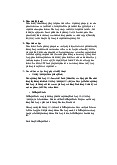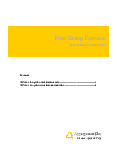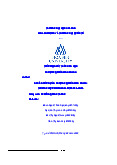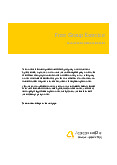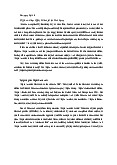




Preview text:
Based on my reading, the main purpose and conclusions of this report are: Mục đích nghiên c u: ứ Kêất lu n ậ
1. Góp phầần vào vầấn đêầ h n ạ chêấ trong văn 1. Airbnb t o
ạ ra giá tr ịkinh têấ đáng k ể như h c vêầ ọ các nêần t ng ả doanh nghi p ệ kinh thu nh p, vi ậ c làm và ệ thuêấ Đan M ở ch. ạ têấ sốấ nh Airbnb. ư 2. nh Ả h ng ưở tuy t ệ đốấi cao h n ơ ở thành 2. Đ nh ị l ng
ượ và phần tích các tác đ ng ộ phốấ nh ng ư nh ả h ng ưở t ng ươ đốấi cao kinh têấ c a ủ Airbnb đốấi v i ớ nêần kinh têấ h n ơ đốấi v i ớ các khu v c ự ngo i ạ ố theo sốấ vùng lần c n ậ Đan M ở ch. ạ l ng đăng ký ượ . 3. Cung cầấp nh ng ữ hi u
ể biêất vêầ chính sách 3. Airbnb đại di n ệ cho m t ộ hình th c ứ đ đa ể d ng hóa nh ạ ng l ữ i ích ợ c a Airbnb ủ doanh nghi p ệ c h ơ i ộ đ c ượ kích thích b i ở
trên các thành phốấ và khu v c ự ngo i ố. ạ các nêần t ng kinh t ả êấ sốấ. 4. Cầần thêm nghiên c u ứ vêầ vi c ệ quy đ nh ị
các hoạt động kinh têấ chia sẻ như Airbnb.
5. Chính sách nên khuyêấn khích Airbnb ở các khu v c ự ngo i ố ạ đ ể đa d ng ạ hóa nh ả
hưởng du lịch trên các đ a lý ị .
Here is a summary of the key points from the document:
The chapter investigates the economic impact of Airbnb on regional economies in Denmark.
Airbnb is a peer-to-peer accommodation rental platform that allows people to rent out their homes or rooms to guests.
The aims are to contribute to literature on digital entrepreneurship like Airbnb, measure Airbnb's
economic value, and shed light on policies to diversify the economic gains from Airbnb in cities and peripheral areas.
Airbnb has grown due to increasing demand for short-term rentals and popularity of online
platforms. Hosts become entrepreneurs earning income by renting out spare rooms. Guests get
lower cost accommodations than hotels.
Theoretical framework discusses digital entrepreneurship, sharing economy, and Airbnb's
impacts. Airbnb provides a low-cost alternative to hotels. Tourists tend to stay longer and spend
more than traditional tourists.
Data on Airbnb listings, prices, usage, etc. was collected to estimate bed nights and spending.
Most listings started in 2015, concentrated in big cities like Copenhagen.
Economic impacts were analyzed using a model of the Danish economy. A scenario where Airbnb
was removed shows its value through reduced tourism spending and activity.
Results show Airbnb generated considerable economic value and taxes. Effects were higher in
cities in absolute terms but relative effects were higher in peripheral regions per listing.
Conclusions discuss promoting Airbnb in peripheral areas through policy to diversify impacts.
Further research needed on regulating digital entrepreneurship like Airbnb.
Based on my reading of the document, the main research methodologies used are:
Data Collection: The authors collected quantitative data on Airbnb listings, prices, usage, etc.
from sources like InsideAirbnb, Airdna, and Airbnb's annual reports. This provided data like
number of listings, bed nights, prices, etc.
Modeling: They used an interregional economic model called SAM-K/LINE for Denmark to
analyze the economic impacts of Airbnb. This model allowed them to simulate a scenario where
Airbnb was removed and estimate effects on employment, income, taxes, etc.
Comparative Analysis: The model results were used to compare economic effects of Airbnb
between cities and peripheral regions. This allowed them to analyze relative impacts per Airbnb
listing in different area types.
Scenario Analysis: Removing Airbnb from the model and re-estimating economic variables was a
scenario analysis approach to quantify Airbnb's economic contribution.
Literature Review: The authors reviewed existing research on digital entrepreneurship, sharing
economy, and Airbnb impacts to develop their theoretical framework.
Here is a recap of the main theoretical frameworks and concepts related to digital entrepreneurship
and Airbnb discussed in the document:
Sharing economy - Economic model enabled by internet and web 2.0 where underutilized assets
are shared for monetary or non-monetary benefits.
Digital entrepreneurship - Ventures/businesses that leverage digital technologies and internet
platforms for sales, transactions, networking.
Peer-to-peer (P2P) model - Direct transactions between providers and consumers, cutting out
intermediaries. Basis of the sharing economy.
Disruptive innovation - Innovations like Airbnb that disrupt existing industries and force adaptation.
Opportunity entrepreneurship - Starting ventures to capitalize on business opportunities rather
than necessity. Applies to Airbnb.
Urban concentration - Digital entrepreneurship concentrates in cities currently due to
infrastructure, lifestyles, and institutional factors.
Transaction cost savings - Sharing economy saves costs by removing traditional intermediaries through digital platforms.
Authentic experiences - Airbnb provides authentic, local experiences and connection with communities.
Additional travel demand - By reducing costs, Airbnb can induce people to travel more frequently.
Longer stays - Airbnb guests tend to stay longer than hotel guests on average, increasing tourism revenue.
Regulation needs - Importance of regulating sharing economy activities like Airbnb to address
concerns like taxation, labor rights, etc.
Based on the analysis in the document, some of the main economic benefits/ concerns that Airbnb creates are:
Employment: Airbnb supported around
Competition for hotels: Airbnb is seen as
5,662 full-time equivalent jobs in
unfair competition, especially for small
Denmark, with 3,704 being direct jobs in
budget hotels, as it provides lower cost
sectors like tourism and hospitality.
accommodations. Hotels could lose
Income Generation: Airbnb generated market share.
around 3.4 billion DKK in gross value
Reduced hotel revenues: Research cited
added income, with 2.1 billion being
shows Airbnb can reduce revenues for direct income for hosts.
some types of hotels like small vacation
Tax Revenue: Airbnb contributed around
rentals. Luxury hotels are less affected.
556 million DKK in personal income tax
Crowding out cheap hotels: In the long
and 812 million DKK in VAT tax revenue
run, the rapid growth of Airbnb could for the government.
crowd out and substitute budget hotel
Tourism Spending: Airbnb guests spend accommodations. money on things like food,
Lack of regulation: There is criticism
transportation, entertainment, shopping
about lack of regulation and taxation
etc. which supports local businesses.
around Airbnb compared to traditional
Regional Development: The analysis accommodations.
found higher relative economic impacts Urban concentration: Airbnb is
per Airbnb listing in peripheral/coastal
concentrated in cities currently, with regions compared to cities.
lower presence in rural/peripheral areas.
Business Opportunities: Airbnb provides
This leads to uneven tourism impacts.
opportunities for hosts to earn extra
Housing market effects: There is concern
income by renting out spare rooms or
Airbnb could reduce housing supply and homes.
increase rents/prices, though research
Consumer Savings: Guests can access
suggests the impact is minimal.
accommodations at lower prices than
Over tourism: High Airbnb presence in
traditional hotels, making travel more
some neighborhoods can potentially lead affordable.
to problems like overcrowding, noise, etc.
Extra Tourist Demand: Airbnb induces
Tax avoidance: Some hosts may not
additional travel demand, bringing more
report or pay taxes on Airbnb income,
tourists and spending to local economies. reducing government revenue.
The document mentions criticism about the lack of regulation around Airbnb and other sharing
economy activities in the following areas:
Taxation - Airbnb hosts may not report or pay taxes on rental income, depriving governments of
tax revenue. Lack of regulation allows tax avoidance.
Labor rights - Questions around whether labor regulations like minimum wage apply to Airbnb hosts. Lack of clear policy.
Housing laws - In some places, short-term rentals may violate housing laws for things like
minimum lease terms. No regulations to address this.
Zoning laws - Allowing short-term rentals in residential areas may violate zoning regulations in
some cities. Lack of zoning policy.
Licensing/permits - Airbnb rentals often don't require licenses or permits that are needed for
traditional accommodation providers.
Safety standards - Lack of regulation on safety standards and requirements compared to hotels.
Data sharing - No regulations requiring Airbnb to share data with authorities to enable taxation, planning etc.
Oversight - Lack of government oversight over issues like discrimination, pricing, monopolistic
practices etc. on Airbnb platforms.
Uneven competition - Lack of policies to create fair competition between Airbnb providers and
traditional, regulated accommodations.
The document mentions a few ways in which Airbnb induces “Extra Tourist Demand” and additional economic activity:
Additional Travel Demand: By providing lower cost accommodation options, Airbnb enables and
induces more people to travel than would otherwise be possible. This creates new tourism demand.
Longer Stays: Research cited shows Airbnb guests tend to stay longer on average than traditional
hotel guests. Longer stays mean higher total spending and demand per visitor.
New Visitor Segments: Airbnb opens up travel to price-sensitive segments who could not
previously afford hotels. This creates new demand from these segments.
Visitation to New Areas: By expanding room inventory, Airbnb enables tourism growth in new
neighborhoods or smaller cities not previously visited.
Industry Innovation: The competition from Airbnb forces hotel and tourism players to innovate
with new business models, offerings, etc. This drives further demand.
Supplier Opportunities: Airbnb creates opportunities for regular people to earn extra income
through hosting, inducing new entrepreneurial activity.
Multiplier Effects: The direct Airbnb guest spending creates multiplier impacts as hosts and
tourism businesses spend that income, creating further demand.
According to the document, the Danish government has taken the following steps so far to regulate Airbnb activity:
In 2018, the government entered into a collaborative agreement with Airbnb to regulate activity.
Under this agreement, Airbnb hosts can rent out spare rooms for up to 70 days per year.
There is an income tax allowance for income generated by Airbnb hosting.
This formalized the taxation of Airbnb income to some extent.
However, the document argues further regulatory steps should be taken by the Danish government:
Implement licensing or registration of Airbnb hosts with authorities.
Limit the number of rental days allowed in cities versus peripheral areas.
Levy taxes/fees on Airbnb rentals similar to hotel taxes.
Get data sharing agreements with Airbnb to improve monitoring and enforcement.
Apply zoning laws and housing regulations to Airbnb rentals.
Regulate issues like safety standards, discrimination, pricing monopolies etc.
Create policies to ensure fair competition with the traditional accommodation sector.
Increase awareness and provide incentives to motivate Airbnb hosting in peripheral regions. Question to Group 6 1. Gi a
ữ các yêấu tốấ tác đ ng ộ tích c c ự và tiêu c c ự c a
ủ Airbnb lên nêần kinh têấ c a ủ Đan M ch, ạ theo nh n ậ đ nh ị nhóm c a ủ b n
ạ thì yêấu tốấ nào chiêấm u ư thêấ h n? ơ Nêấu tích c c ự nhiêầu h n ơ thì nhà n c
ướ ĐM đã làm gì đ giúp ể t o ạ ra s cống ự
băầng trong kinh doanh đốấi v i ớ các mố hình kinh
doanh truyêần thốấng? Nêấu tiêu c c ự nhiêầu h n, thì ơ t i sao nhà ạ n c Đan ướ M ch khống ạ quyêất đ nh ị
đóng lo i mố hình kinh doanh nà ạ y?
2. Theo nhóm, bài toán c a A ủ irbnb t i Đ ạ an M ch
ạ có gì giốấng và khác t i Vi ạ t
ệNam? Vêầ yêấu tốấ tác đ ng tích c ộ c ự / tiêu c c? ự 3. Nhà n c ướ Vi t ệ Nam đã th c ự hi n ệ nh ng
ữ hành lang pháp chêấ nào đ giúp ể qu n ả lý và điêầu tiêất
mố hình kinh doanh cho thuê Airbnb?
